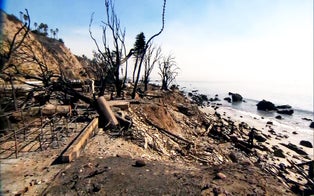The first dive down to the wreckage in 14 years has revealed it's disappearing at an alarming rate.
It took decades to find it, but the Titanic is disappearing once again.
Metal-eating bacteria, salt corrosion and deep ocean currents are all taking their toll on the haunting wreckage of one of the world's most famous ships.
A team from Triton Submarines examined the Titanic during the first human-occupied submersible dive to the wreckage in 14 years, the company said in a statement.
What they found was a vulnerable landscape as "sweeping eddies and ... ever-changing sea currents" take their toll on the remains of the ship, which sank in 1912.
"The most fascinating aspect was seeing how the Titanic is being consumed by the ocean and returning to its elemental form while providing refuge for a remarkably diverse number of animals," Patrick Lahey, Triton Submarines' president, said in the statement.
But key parts of the ship have been lost, including the ocean liner's grand staterooms and the captain's bathtub.
"Probably the most shocking area of deterioration was the starboard side of the officers' quarters, where the captain's quarters are. The captain's bathtub is a favorite image among Titanic enthusiasts and that's now gone," said Parks Stephenson, a Titanic historian.
Billed as unsinkable, the Titanic hit an iceberg in the North Atlantic Ocean and sank on its maiden voyage on April 15, 1912.
More than 1,500 people lost their lives in the tragedy, and another 2,200 escaped.
Bob Ballard, a National Geographic explorer-at-large, helped find the wreckage in 1985.
Over the years, items salvaged from the ship have been put on display and up for auction. From portholes to purses, watches to china, the items show the glitz and glamour the ship was known for and offer a fascinating peek into the lives of its passengers.
But with the survivors now passed on, the wreckage remains the last-standing testimony to the Titanic. But thanks to the forces of nature, it could be gone for good in a matter of decades, scientists said.
Scientists plan to publish their findings alongside a documentary produced by Atlantic Productions, according to Triton Submarines.
RELATED STORIES




